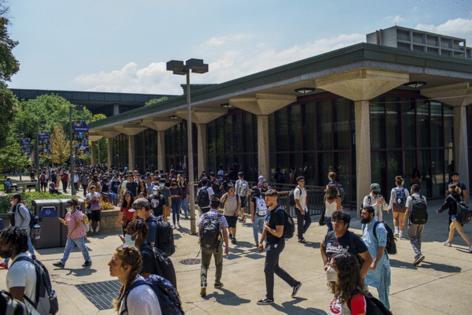Commentary: 20% of college students are parents. Here's how we can do more to help them
Published in Op Eds
The latest national report on students who left college without earning a degree contains some sobering data: Approximately 2.1 million students stopped higher education between January 2022 and July 2023, swelling the “some college-no degree” population to more than 43 million Americans.
What’s contributing to this national crisis is a higher education system that’s no longer designed for what has become a traditional college student. Colleges used to be filled with students who attended class every day, could study with friends every night and go to parties on weekends because they had so few responsibilities.
But for about 3 million students who are also parents, the reality is much different. These student-parents are balancing coursework with working full time, picking up their children from school and studying for long hours after their families are asleep. They’re putting in every ounce of effort to obtain a certificate or college degree because they believe an education will greatly improve their lives.
While 1 in 5 undergraduates are raising a child while enrolled in college, higher education remains largely structured around the needs of students without caregiving responsibilities. The outcomes speak for themselves: J ust 18% of student-parents earn a degree within six years. This disparity is not a reflection of ability or ambition. It is the result of a series of obstacles — rigid class schedules, unaffordable child care, the cost of tuition and books, and the strain on mental health — that make balancing school with work, caregiving and other responsibilities nearly impossible. Without targeted support, these highly motivated learners are being set up to fail.
Addressing these challenges is especially critical because student-parents are among those who stand to benefit the most from earning a degree. Data from the Institute for Women’s Policy Research reveals that for every additional level of education, poverty rates for single mothers declined by an average of 33%. Yet many colleges still lack tailored resources for student-parents, leaving them to navigate a system that wasn’t built for them.
Just consider the impressively demanding schedules many of these learners manage each day. Student-parents often experience what researchers call “time poverty” because there are quite literally not enough hours in the day. More than one-third of student-parents work full time. Research shows that, after work and child care responsibilities, students with preschool-aged children are left with just 10 hours per day in which they must cram in sleeping, eating and studying. Institutions and state higher education systems must move away from one-size-fits-all approaches and adopt policies that reflect the realities of student-parents’ lives.
For example, One Million Degrees — a Chicago-based nonprofit that uses a mix of advising, mentoring, career services and financial aid to help community college students graduate — has seen just how critical flexible scheduling can be for student-parents. Nearly one-third of our participants chose evening or weekend time slots in our recent onboarding process. Many were parents of young children who could only attend intake meetings after their children were asleep. Several told us that without these options, they might not have been able to participate at all.
Greater flexibility alone isn’t enough, however. Nearly one-third of student-parents live at or near the poverty line. Institutions are finding that one of the most effective ways to support these students is also deceptively straightforward: providing direct financial assistance when they need it most. Rapid, one-time financial support has proved to be a powerful tool for preventing financial setbacks from derailing a student’s education. Emergency grants offer immediate relief for urgent expenses such as rent, utilities or unexpected car repairs. They prevent a short-term challenge from snowballing into a long-term crisis. A flat tire or an unexpected child care closure should not force a determined student-parent to drop out.
A growing number of states and institutions are implementing interventions to help student-parents stay on track. In California and Texas, priority class registration now gives student-parents the ability to build course schedules that fit their busy lives. City Colleges of Chicago has expanded wraparound support for student-parents across the system. At Olive-Harvey College, students now have access to a child care center, children’s clothing and other child care items. The college’s student support office is also experimenting with flexible service hours to better accommodate students’ needs.
Hope Chicago is taking a two-generation approach to breaking through the barriers created by poverty for parent learners by providing scholarships plus critical wraparound support to recent high school graduates and one of their parents or guardians. For every $1 invested, the program generates a powerful economic return of 400% in economic and societal benefits, including increased family earnings and improved health outcomes.
Most student-parents would only pursue a degree or certification in an in-demand field — such as health care, technology, business, education and the skilled trades — that will translate directly into a well-paying career. Institutions looking to expand their student-parent population should offer programs in these fields alongside paid apprenticeships and internships that will help them gain hands-on, marketable skills.
Fulfilling the promise of higher education for student-parents yields substantial returns by enhancing their career prospects and strengthening the economic vitality and fiscal health of their families and communities. Student-parents represent a massive pool of untapped talent; they have the drive and determination to succeed. It’s time for higher education to meet them where they are and provide the support they need to not only enroll but ultimately reach the finish line.
____
Rita Raichoudhuri is the chief programs officer for One Million Degrees. Michele Howard is the chief program officer of Hope Chicago.
___
©2025 Chicago Tribune. Visit at chicagotribune.com. Distributed by Tribune Content Agency, LLC.

























































Comments